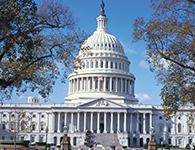NACWA Helps Facilitate Congressional Briefing on Low Income Rate Assistance
 NACWA members participated in a congressional briefing hosted by Representative Marcia Fudge (D-OH) on May 12 that spotlighted the affordability challenges low-income ratepayers face in paying for the rising costs of water, sewer and stormwater bills. Briefing participants included NACWA Board members Julius Ciaccia, CEO of the Northeast Ohio Regional Sewer District, and George Hawkins, General Manager of DC Water. They were joined by Kishia Powell, Director of Public Works for the City of Jackson, MS and Eric Rothstein, a national expert on ratepayer affordability challenges. The briefing drew a great crowd, both in person and with over 150 people participating via live streaming online.
NACWA members participated in a congressional briefing hosted by Representative Marcia Fudge (D-OH) on May 12 that spotlighted the affordability challenges low-income ratepayers face in paying for the rising costs of water, sewer and stormwater bills. Briefing participants included NACWA Board members Julius Ciaccia, CEO of the Northeast Ohio Regional Sewer District, and George Hawkins, General Manager of DC Water. They were joined by Kishia Powell, Director of Public Works for the City of Jackson, MS and Eric Rothstein, a national expert on ratepayer affordability challenges. The briefing drew a great crowd, both in person and with over 150 people participating via live streaming online.
A number of recent surveys of wastewater and drinking water utilities throughout the country demonstrate that utilities have been increasing their rates at double the rate of inflation for several consecutive years in an effort to keep pace with new environmental compliance obligations and to upgrade outdated infrastructure. These increases show no signs of abating, and many utilities are on track to continue increasing rates for the foreseeable future. These issues have gained the attention of Congress and the purpose of the briefing – which NACWA helped facilitate – was to highlight the important role low-income rate assistance plans can play in addressing affordability concerns.
During the briefing, Powell described the “rate shock” that occurred several years ago in the City of Jackson when sewer rates increased over 100%, which led many residents to stop paying their water and sewer bills. Ciaccia and Hawkins both discussed the affordability challenges facing their communities in providing clean water services, but noted the value of having assistance programs available to support low-income households. Rothstein highlighted, from a national perspective, the growing affordability concerns facing utilities nationwide as rates continue to rise and the important role that low-income assistance programs can play in addressing these challenges.
Representative Fudge has introduced legislation, H.R. 4542, the Low Income Sewer and Water Assistance Program Act, to establish a pilot program to award grants to low-income households to assist with payment of water and sewer bills. Other legislative proposals call for a study to examine the viability of establishing such a proposal. NACWA strongly supports these efforts and thanks Rep. Fudge for her bold leadership on this issue. The Association looks forward to continued advocacy on affordability concerns. The briefing presentation slides are available here  .
.
Water Sector Joins with NACWA on WRDA Stormwater Request
 NACWA forwarded a letter
NACWA forwarded a letter to Members of the House Transportation & Infrastructure (T&I) Committee on May 10 in support of a legislative provision addressing how the U.S. Army Corps of Engineers works with local entities on projects that impact stormwater. NACWA is advocating to include the provision in the House’s 2016 Water Resources Development Act (WRDA), and was joined on the letter by six other water sector organizations – the American Water Works Association (AWWA), the National Association of Flood & Stormwater Management Agencies (NAFSMA), the Association of Metropolitan Water Agencies (AMWA), Water Environment Federation (WEF), the WateReuse Association, and the American Public Works Association (APWA) – showing valuable ‘one water’ unity on the issue.
to Members of the House Transportation & Infrastructure (T&I) Committee on May 10 in support of a legislative provision addressing how the U.S. Army Corps of Engineers works with local entities on projects that impact stormwater. NACWA is advocating to include the provision in the House’s 2016 Water Resources Development Act (WRDA), and was joined on the letter by six other water sector organizations – the American Water Works Association (AWWA), the National Association of Flood & Stormwater Management Agencies (NAFSMA), the Association of Metropolitan Water Agencies (AMWA), Water Environment Federation (WEF), the WateReuse Association, and the American Public Works Association (APWA) – showing valuable ‘one water’ unity on the issue.
The House T&I Committee staff is working hard on developing the bill, which is anticipated to be introduced and marked up by Committee before the end of May. The House bill is expected to be far narrower than the Senate’s bill and focused solely on U.S. Army Corps’ project authorizations and policies. If and when both the House and Senate pass legislation and go to conference, NACWA will work to ensure that the conference bill merging the two includes all the provisions helpful to clean water utilities.
NACWA Hosts Meeting to Discuss Key Clean Water Advocacy Priorities
 NACWA hosted a meeting May 13 of municipal and water sector organizations to discuss collaborative efforts on a number of key clean water policy and advocacy issues. A central focus of discussion was the 2016 WRDA bill and how to ensure the municipal clean water community’s priorities are included in a final package. The organizations agreed to coordinate advocacy efforts in advancing a WRDA bill containing key elements of the Senate version, especially regarding affordability and low-income ratepayer concerns.
NACWA hosted a meeting May 13 of municipal and water sector organizations to discuss collaborative efforts on a number of key clean water policy and advocacy issues. A central focus of discussion was the 2016 WRDA bill and how to ensure the municipal clean water community’s priorities are included in a final package. The organizations agreed to coordinate advocacy efforts in advancing a WRDA bill containing key elements of the Senate version, especially regarding affordability and low-income ratepayer concerns.
Other topics discussed during the meeting included ensuring robust funding for water sector priorities in Fiscal Year (FY) 2017 federal appropriation bills, coordination on EPA’s ongoing Phase II stormwater rulemaking, and concern over a proposed Internal Revenue Service (IRS) rule that could impact the ability of some water and clean water utilities to access tax exempt municipal bonds.
Organizations participating in the meeting included AMWA, AWWA, the Water Environment & Reuse Foundation, NAFSMA, the WateReuse Association, the Water Research Foundation (WRF), the Association of Clean Water Administrators (ACWA), and the National League of Cities (NLC). NACWA is committed to strong collaboration with other municipal and water sector organizations wherever possible to advance the Association’s advocacy priorities.
Association Shares Perspective on Ag Nutrient Issues
 NACWA provided remarks during a meeting of Association of Clean Water Administrators (ACWA) and the National Association of State Departments of Agriculture (NASDA) on May 10 outlining the Association’s current advocacy efforts with regard to nutrients. The meeting – the first of its kind – brought together top water regulators and agricultural officials from several states to identify issues of mutual interest and explore potential areas for collaboration to better address nonpoint discharges of nutrients.
NACWA provided remarks during a meeting of Association of Clean Water Administrators (ACWA) and the National Association of State Departments of Agriculture (NASDA) on May 10 outlining the Association’s current advocacy efforts with regard to nutrients. The meeting – the first of its kind – brought together top water regulators and agricultural officials from several states to identify issues of mutual interest and explore potential areas for collaboration to better address nonpoint discharges of nutrients.
NACWA outlined the challenges faced by the point source community in addressing the nutrient issue, but also highlighted where NACWA members are taking leadership roles on watershed-level water quality partnerships to engage all sources of nutrients in meaningful solutions. ACWA and NASDA hope this first meeting will lead to an ongoing dialogue between the two organizations and their respective members at the state level.
WSCC Meets with Government Council to Discuss Utility Security Issues
 The Water Sector Coordinating Council (WSCC), which oversees utility partnership with federal agencies on matters related to security and emergency preparedness, held its quarterly meeting in Washington DC on May 9-10. NACWA’s two representatives to the WSCC – Patty Cleveland, Assistant Regional Manager with the Trinity River Authority, Texas, and Chair of the WSCC, and Jim Davidson, Manager of Safety & Security for the Northeast Ohio Regional Sewer District – both participated in the meeting.
The Water Sector Coordinating Council (WSCC), which oversees utility partnership with federal agencies on matters related to security and emergency preparedness, held its quarterly meeting in Washington DC on May 9-10. NACWA’s two representatives to the WSCC – Patty Cleveland, Assistant Regional Manager with the Trinity River Authority, Texas, and Chair of the WSCC, and Jim Davidson, Manager of Safety & Security for the Northeast Ohio Regional Sewer District – both participated in the meeting.
The WSCC heard a presentation by Chris Brown, from the Office of Emergency Management & Preparedness of the Occupational Safety & Health Administration (OSHA), about protecting wastewater workers from Ebola and other pathogens. The WSCC discussed the use of personal protective equipment (PPE) and how the water sector needs to have better guidelines for PPE usage. As ongoing research clarifies the fate and impacts of Ebola and other emerging pathogens in wastewater, this will be a continued topic of discussion for the WSCC and the water sector associations.
The Water Sector Government Coordinating Council (GCC) joined the WSCC on May 10, and the joint meeting included discussions with Caitlin Durkovich, Assistant Secretary of the Department of Homeland Security (DHS), and Peter Grevatt, Director of the Office of Groundwater and Drinking Water at EPA. The WSCC and GCC also provided input to the EPA Office of Research & Development on their projects related to security – including cybersecurity – of drinking water and wastewater utilities.
Federal Appeals Court Accepts NACWA’s Brief in Permit Shield Litigation
 The U.S. Court of Appeals for the Fourth Circuit accepted
The U.S. Court of Appeals for the Fourth Circuit accepted NACWA’s amicus curiae brief
NACWA’s amicus curiae brief
 May 9 in an appeal of a federal district court ruling that, if upheld, could create significant legal vulnerabilities for Member Agencies and other holders of National Pollutant Discharge Elimination System (NPDES) permits.
May 9 in an appeal of a federal district court ruling that, if upheld, could create significant legal vulnerabilities for Member Agencies and other holders of National Pollutant Discharge Elimination System (NPDES) permits.
In Ohio Valley Environmental Coalition et al. vs. Fola Coal Company  , a lower federal court ruled
, a lower federal court ruled
 that despite the absence of a specific effluent limit for a certain parameter in the NPDES permit, the permittee’s discharge caused or materially contributed to a significant adverse impact in violation of the narrative water quality criteria incorporated by reference into the permit. The Court then created its own numeric effluent limitation for the permit, and further found that compliance with this effluent limitation is a prerequisite for protection under CWA §402(k). Section 402(k) establishes that compliance with a NPDES permit is compliance with the CWA and provides a shield from citizen suits (the permit shield).
that despite the absence of a specific effluent limit for a certain parameter in the NPDES permit, the permittee’s discharge caused or materially contributed to a significant adverse impact in violation of the narrative water quality criteria incorporated by reference into the permit. The Court then created its own numeric effluent limitation for the permit, and further found that compliance with this effluent limitation is a prerequisite for protection under CWA §402(k). Section 402(k) establishes that compliance with a NPDES permit is compliance with the CWA and provides a shield from citizen suits (the permit shield).
The lower court’s decision, unless overturned, can and will be used by environmental activist groups to upend the NPDES permitting process and usurp the State’s authority to interpret water quality standards. NACWA is participating in this case to help preserve the permit shield as a strong defense for NPDES permit holders against enforcement actions. NACWA’s participation is part of a broad coalition of diverse groups, including industrial and agricultural point source dischargers, which share a common interest in defending the permit shield defense. For more details on the case, see NACWA Litigation Tracking  and the April 25 Clean Water Current.
and the April 25 Clean Water Current.
NACWA’s June 15 Hot Topics in Clean Water Law webinar will address this and other pending permit shield litigation. Participation is free and registration will open soon.
‘Toilets Are Not Trashcans’ Gaining Media Attention
 As the flushable wipes issue continues to plague clean water utilities across the country, NACWA’s ‘Toilets Are Not Trashcans’ (TANT) campaign has been quickly gaining attention. The TANT campaign was featured in a recent article with quotes from NACWA’s Director of Regulatory Affairs, Cynthia Finley, talking about this nationwide challenge. Wipes are a huge problem for utilities everywhere, causing massive clogs that are difficult and expensive to remove. One study conducted in Maine found that wipes made up about half of the material that did not break down in the sewer system.
As the flushable wipes issue continues to plague clean water utilities across the country, NACWA’s ‘Toilets Are Not Trashcans’ (TANT) campaign has been quickly gaining attention. The TANT campaign was featured in a recent article with quotes from NACWA’s Director of Regulatory Affairs, Cynthia Finley, talking about this nationwide challenge. Wipes are a huge problem for utilities everywhere, causing massive clogs that are difficult and expensive to remove. One study conducted in Maine found that wipes made up about half of the material that did not break down in the sewer system.
Many utilities are joining the TANT campaign to educate their customers about what can and cannot be flushed down toilets. NACWA Member Agency the Camden County Municipal Authority will be including an educational flier about what is flushable using the TANT logo along with their next bill mailing, and Member Agency LA Sanitation also is using the TANT logo on their educational pieces.
The TANT logo available free for all to use for educational purposes. Please contact
Bredy TrombinoThis e-mail address is being protected from spambots. You need JavaScript enabled to view it
to receive the logo.
Senate Passes Its First FY17 Appropriations Bill
 The Senate took a step forward on its Fiscal Year (FY) 2017 Appropriations bills last week with passage of the FY17 Energy & Water Appropriations bill. The bill passed on a vote of 90-8. The bill appropriates a total of $37.5 Billion –for the Department of Energy (DOE), the Department of Interior’s Bureau of Reclamation and the U.S. Army Corps of Engineers. While many individual U.S. Army Corps’ projects received funding through the bill, including some in NACWA member areas, many other deserving projects did not receive funds in the current tight federal budget environment.
The Senate took a step forward on its Fiscal Year (FY) 2017 Appropriations bills last week with passage of the FY17 Energy & Water Appropriations bill. The bill passed on a vote of 90-8. The bill appropriates a total of $37.5 Billion –for the Department of Energy (DOE), the Department of Interior’s Bureau of Reclamation and the U.S. Army Corps of Engineers. While many individual U.S. Army Corps’ projects received funding through the bill, including some in NACWA member areas, many other deserving projects did not receive funds in the current tight federal budget environment.
Top Senate Appropriators noted that this was the first time an Energy & Water Appropriations bill has passed the Senate in regular order since 2009. As reported in NACWA’s March/April Legislative Update  , debate and passage of the legislation was delayed by a controversial amendment related to Iran – leading to three failed procedural votes before the bill passed last week. Appropriators indicated they are proud the Senate was able to move forward eventually on the bill and suggested this bodes well for their ability to pass additional Appropriations bills yet this year. The next FY17 Appropriations bills to be considered are Transportation, Housing and Urban Development and Military Construction and Veterans Affairs. NACWA will continue to follow the Appropriations process. Contact
Kristina SurfusThis e-mail address is being protected from spambots. You need JavaScript enabled to view it
, Legislative Affairs Manager with inquiries regarding Appropriations.
, debate and passage of the legislation was delayed by a controversial amendment related to Iran – leading to three failed procedural votes before the bill passed last week. Appropriators indicated they are proud the Senate was able to move forward eventually on the bill and suggested this bodes well for their ability to pass additional Appropriations bills yet this year. The next FY17 Appropriations bills to be considered are Transportation, Housing and Urban Development and Military Construction and Veterans Affairs. NACWA will continue to follow the Appropriations process. Contact
Kristina SurfusThis e-mail address is being protected from spambots. You need JavaScript enabled to view it
, Legislative Affairs Manager with inquiries regarding Appropriations.
Congrats to DC Water on the Launch of Bloom!
 NACWA Member Agency DC Water launched its first biosolids product – Bloom – May 12 during an event in Washington, DC. Bloom (bloomsoil.com) is being marketed as a soil conditioner made from Class A biosolids and DC Water has already established partnerships with the DC government and a local nonprofit to begin using the product across the District. George Hawkins, DC Water CEO & General Manager and NACWA Board Member, was joined by key stakeholders and members of DC Water’s Board of Directors to formally announce the new product. The concept for Bloom, its logo and labelling were all envisioned and executed by DC Water staff. Congratulations to Hawkins and the entire DC Water team on this achievement!
NACWA Member Agency DC Water launched its first biosolids product – Bloom – May 12 during an event in Washington, DC. Bloom (bloomsoil.com) is being marketed as a soil conditioner made from Class A biosolids and DC Water has already established partnerships with the DC government and a local nonprofit to begin using the product across the District. George Hawkins, DC Water CEO & General Manager and NACWA Board Member, was joined by key stakeholders and members of DC Water’s Board of Directors to formally announce the new product. The concept for Bloom, its logo and labelling were all envisioned and executed by DC Water staff. Congratulations to Hawkins and the entire DC Water team on this achievement!
Kern County Biosolids Litigation Moves Forward
 After 8 days of testimony, the bench trial in City of Los Angeles, et al. v. County of Kern
After 8 days of testimony, the bench trial in City of Los Angeles, et al. v. County of Kern concluded on May 6. This California case involves Kern County’s discriminatory local land application ban (Measure E) and its long-running effort to restrict the imports of biosolids from Southern California communities for spreading on a Los Angeles owned farm.
concluded on May 6. This California case involves Kern County’s discriminatory local land application ban (Measure E) and its long-running effort to restrict the imports of biosolids from Southern California communities for spreading on a Los Angeles owned farm.
A California appellate court issued a strong legal decision in February 2013 in support of biosolids land application, upholding an injunction against the ban and echoing arguments made by NACWA in the litigation. In July 2014, the California Supreme Court overturned
in February 2013 in support of biosolids land application, upholding an injunction against the ban and echoing arguments made by NACWA in the litigation. In July 2014, the California Supreme Court overturned
 the appellate court decision on a procedural issue unrelated to the underlying legal question regarding the Kern County ban. The appellate court’s finding that the Kern County ban is illegal remains the law of the case, and the preliminary injunction against Measure E that was issued in 2006 remains in place.
the appellate court decision on a procedural issue unrelated to the underlying legal question regarding the Kern County ban. The appellate court’s finding that the Kern County ban is illegal remains the law of the case, and the preliminary injunction against Measure E that was issued in 2006 remains in place.
The municipal plaintiffs refiled a legal challenge to the ban in state trial court, which is the pending case that has gone to trial. Plaintiffs expect to secure a new decision permanently striking down the ban. NACWA was an active participant in the original state case, providing a vital national clean water perspective to the court, and is closely tracking developments in the current litigation.
Final briefing in the case will take place this summer with a decision expected in October. See Plaintiff’s Trial Memo and NACWA Litigation Tracking
and NACWA Litigation Tracking for more details on the case.
for more details on the case.
DOE Better Buildings Challenge Launches Wastewater Infrastructure Accelerator
 The Department of Energy’s Better Buildings Challenge program is launching three new accelerator programs, including the Better Buildings Wastewater Infrastructure Accelerator, a program to make wastewater facilities more efficient, and the Better Buildings Combined Heat and Power for Resiliency Accelerator, a program to increase the use of combined heat and power. The Wastewater Infrastructure Accelerator aims to improve the energy efficiency of partnering wastewater facilities by at least 30% and integrate at least one resource recovery measure.
The Department of Energy’s Better Buildings Challenge program is launching three new accelerator programs, including the Better Buildings Wastewater Infrastructure Accelerator, a program to make wastewater facilities more efficient, and the Better Buildings Combined Heat and Power for Resiliency Accelerator, a program to increase the use of combined heat and power. The Wastewater Infrastructure Accelerator aims to improve the energy efficiency of partnering wastewater facilities by at least 30% and integrate at least one resource recovery measure.
Since the launch of the better Buildings Challenge in 2011, the number of partners and energy efficiency commitments have tripled, resulting in $1.3 billion in energy cost savings and cutting 10 million tons of carbon emissions. A comprehensive look into the gains made by partners through this challenge can be found in the 2016 Better Buildings Progress Update. NACWA Member Agency Victor Valley Wastewater Reclamation Authority (VVWRA) is one of the twelve Better Buildings partners that achieved their energy goal this year by increasing energy efficiency by 27%.
NACWA Visits Oregon, New York
 NACWA took its clean water advocacy message on the road last week, speaking at conferences of regional municipal clean water partner organizations in Oregon and New York.
NACWA took its clean water advocacy message on the road last week, speaking at conferences of regional municipal clean water partner organizations in Oregon and New York.
NACWA participated in the Oregon Association of Clean Water Agencies' (ACWA) Stormwater Summit on May 11 to update the over 100 participants on national stormwater issues. Between the upcoming federal election, the over 14 water bills that have been introduced in Congress in 2016 and the Senate’s recently released Water Resources Development Act, there was a lot to discuss around stormwater provisions in federal legislation. EPA’s Small MS4 Remand Rule and joint USGS Report on Hydrologic Alteration were of particular interest, with their potential to impact the new Phase II General Permit that the Oregon Department of Environmental Quality will finalize in the fall. Oregon ACWA has long been involved with the Association’s state and regional Exchange and the National Stormwater Advocacy Network.
and joint USGS Report on Hydrologic Alteration were of particular interest, with their potential to impact the new Phase II General Permit that the Oregon Department of Environmental Quality will finalize in the fall. Oregon ACWA has long been involved with the Association’s state and regional Exchange and the National Stormwater Advocacy Network.
NACWA also spoke to the Legislative and Regulatory Committee of the New York Water Environment Association on May 10th in Albany, NY. NACWA highlighted efforts to secure strong funding for the State Revolving Fund programs in the FY17 budget as well as legislative efforts related to the WRDA bill.
NACWA continues to work closely with its state counterparts to ensure the clean water community is speaking with one voice at the state, regional and national levels. If you are interested in having NACWA participate in your state or regional conference, please contact
Brenna MannionThis e-mail address is being protected from spambots. You need JavaScript enabled to view it
.
- The National Association of Flood & Stormwater Management Agencies (NAFSMA) has opened its 2016 Green Infrastructure Awards Program
 to recognize communities using GI to advance their wet weather management goals and enhance their communities. Applications are due on May 17. Applications are also available for a separate recognition program for communication
to recognize communities using GI to advance their wet weather management goals and enhance their communities. Applications are due on May 17. Applications are also available for a separate recognition program for communication  around "Improving Water Quality".
around "Improving Water Quality".
- Register today for the U.S. Water Alliance’s One Water Leadership Summit, June 8-10, 2016, in Atlanta, GA. The Summit is the premier gathering of the country’s sharpest minds addressing our nation’s most urgent water challenges to build stronger and more prosperous communities.
- Apply now for the Utility of the Future (UOTF) Today recognition program by 5:00 pm Eastern, June 17, 2016. Applicants must have no major permit violations in the past year prior to the submission date of their applications.

Advancing a One Water/Integrated Planning Approach in Wisconsin
Faced with increasingly stringent regulatory requirements and limited resources, utilities are less able to rely on strategies of the past. Forward-looking utilities are instead seeking innovative, holistic solutions to improve environmental outcomes at reduced cost. Dave Taylor, Director of Ecosystem Services at NACWA Member Agency the Madison Metropolitan Sewerage District, provides a guest blog this week on The Water Voice to discuss how his utility used innovative watershed approaches to deal with nutrient impairment. Read on to find out more!